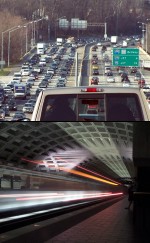A long time ago, on a server far, far away, BeyondDC had a set of Richmond photos. They were in fact some of the first pictures to be shown on the site, back in its very early period. Then one day that far, far away server stopped offering free access, and the embryonic BeyondDC was forced to relocate. Those original Richmond photos – mostly from downtown – were a casualty of the move. Inexperienced with photography and the net, we didn’t have backups, and so the set was lost forever.
Having finally made it back south last November, we’re happy to provide a new gallery of photos. Unlike the lost set, these new photos are primarily of Richmond’s excellent Fan neighborhood, as well as its two grand old train stations. Broad Street Station shares its architectural heritage with the Jefferson Memorial and has been converted to a museum, while the gorgeous Main Street Station has recently been renovated by Amtrak and, after a 28 year hiatus, is once again serving trains.
Average Rating: 4.8 out of 5 based on 235 user reviews.
January 29th, 2007 | Permalink
Tags: galleries
|

Which will Virginians choose? |
Northern Virginians who last week were dancing in the streets over the prospect of a transportation funding deal from Richmond may be left scratching their heads at yet another failure, now that more specifics of the proposed bill are being made available. Most distressing is the piece of fine print that could derail the Dulles Metro extension by forbidding the sale of the toll road to the Washington Airports Authority, which planned to increase tolls in order to pay for the Metro line. Without that sale, the commonwealth cannot afford to build the western half of the extension, which runs from Wiehle Avenue west along the toll road median to the airport and Loudoun County.
While BeyondDC has never been a huge fan of that western segment (we’re generally against locating Metro in highway medians since it limits potential for TOD), we’re aghast that Virginia’s GOP would directly threaten the most important transportation project in Northern Virginia in the very bill they are touting as a transportation solution.
Meanwhile, Virginians are now facing a very real test over cars and transit: Approve the GOP’s plan and add hundreds of millions of dollars to the road construction budget while guaranteeing low tolls on the highway at the expense of a major transit project, or go through another round of negotiations, with the effect that road construction money is delayed and highway tolls raised, but the Metro line gets built.
Are Virginians willing to sacrifice for Metro? We’ll soon find out.
Update: 1/23/06: Virginia Republicans have agreed to remove the provision in question and allow the sale of the toll road to the Airports Authority to go forward. House Speaker William Howell says he was “was not aware of that” provision, that “we don’t intend to do that”, and that it “can be fixed”. How such language found its way into the bill in the first place remains a question, but it appears to be only a minor stumbling block. In other words: call off the hounds.
Average Rating: 4.5 out of 5 based on 166 user reviews.
January 22nd, 2007 | Permalink
Tags: government, transportation
“If you want to stop the flow, you better turn off the spigot”, that according to slow growth advocate Jim Humphrey of the Montgomery County Civic Federation, who favors a proposed building moratorium in Montgomery County. Mr. Humphrey was speaking to the one fundamental truth of growth politics that, ironically, most activists don’t seem to understand – that you can’t really slow growth by adopting exclusionary regulations. Such laws merely push growth to the next jurisdiction further out, exacerbating its effect on sprawl, congestion and environmental destruction.
So what’s the twist? If someone understands that pinching a hose doesn’t stop the water from flowing, why would they support slow growth policies? The answer is in the context. Mr. Humphrey made his statement in response to moratorium opponents who fear strict growth restrictions will send a negative image to the investment world and hurt Montgomery’s economy. He added, “Let’s not worry about a lapse in economic vitality”.
In other words, the Montgomery County slow growth movement, not content with advocating policies that will directly increase sprawl in the more rural counties beyond its borders, increase traffic congestion by forcing people to drive further in order to reach the same destinations, reduce the availability of affordable housing in a region already suffering from a severe shortage, and restrict the freedom of future residents – including slow growthers own children – to live where they so choose, is now actively seeking to weaken the economy.
And yet, inexplicably, the movement continues to gain strength. I guess once I’ve got mine, the rest doesn’t matter.
Average Rating: 4.6 out of 5 based on 222 user reviews.
January 18th, 2007 | Permalink
Tags: development, government
Just a quick administrative note: We’ve replaced the old WordPress-powered commenting system with a new one by Haloscan. The new system is industry-standard and should make commenting much easier and user-friendly. Old comments are still available through the “Permanlink” below each post.
Average Rating: 4.4 out of 5 based on 172 user reviews.
January 9th, 2007 | Permalink
Tags: site















